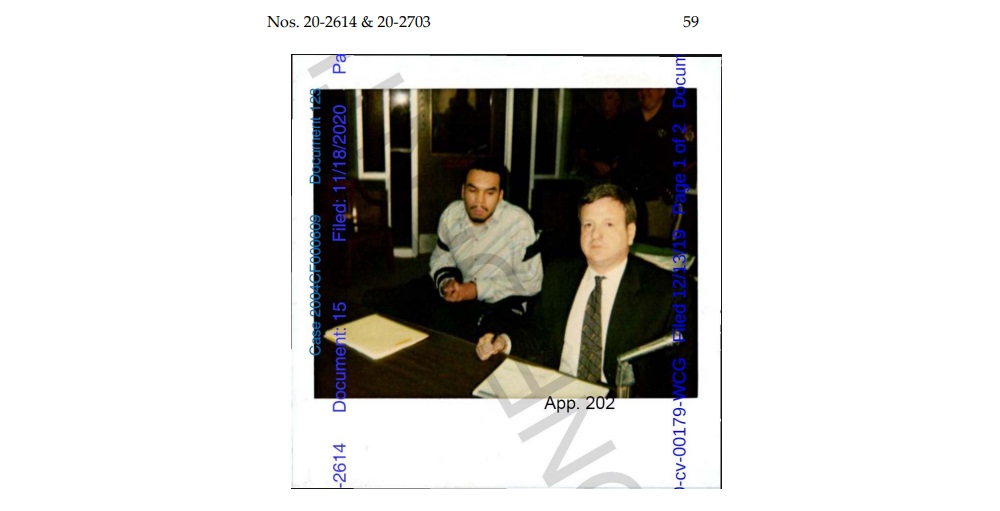Milwaukee Must Pay 2nd Largest Legal Settlement in History
'This is bullsh*t!' Council members angry that botched trial will cost city millions.
Each year for the next 10 years, the City of Milwaukee will have $900,000 less to spend on libraries, police, public health or other programs.
The reason why can be traced back to a mistake a judge made in 2005.
For the closing arguments of a multi-day homicide trial, then-Milwaukee County Circuit Court Judge Mary Kuhnmuench ordered additional shackling for defendant Danny Wilber, which resulted in restraints being visible to the jury. After several appeals, the U.S. Court of Appeals ruled that Wilber was improperly denied his due process rights to a fair trial and he was released after 16 years in custody. District Attorney John Chisholm declined to retry the case.
Wilber wasn’t exonerated, but the Milwaukee Common Council sure seems exasperated.
“This is bullsh*t,” said Alderman Mark Chambers, Jr. repeatedly during a May 8 meeting of the Judiciary & Legislation Committee.
On Tuesday, the council unanimously approved a $6.96 million civil rights settlement with Wilber and his legal team, the People’s Law Firm of Chicago. It had already approved expending up to $350,000 with the Nathan & Kamionski firm to defend the city.
The settlement is the second largest in the city’s history and comes in a case where, as City Attorney Evan Goyke made clear during the May 8 meeting, the defendant wasn’t exonerated. The court vacated the conviction and the district attorney declined to retry the case.
“I just have to say, this is bullsh*t, that we are sitting here essentially approving a $7.2 million, including attorney’s fees, lawsuit on something that was not overturned due to the city’s fault,” said Chambers. “I think it’s bullsh*t that the residents of the city of Milwaukee gotta pay because an incompetent judge at that time, in my opinion, excuse my language, I don’t mean no disrespect, but I do.”
“This time, the Milwaukee Police Department didn’t do much to warrant a $7 million settlement. It’s questionable whether they did anything wrong,” said Ald. Robert Bauman. “The plaintiff simply had to drum up some kind of claim against MPD to have the city left holding the bag. This is clearly the result of a Milwaukee County Circuit Judge making some pretty bad decisions from the bench. And of course, they’re not culpable. The district attorney’s not on the hook. The city ends up holding the bag and that is very distressing.”
“We have to pay the price for some bad judgments and that’s inexcusable,” said Council President José G. Pérez.
On Tuesday, none of the council members talked about the settlement before voting on it, but they had made clear their opinions at last week’s meeting.
In July 2019, the council approved a $7.5 million settlement with Robert Lee Stinson. He had been convicted in 1985 for murder and spent 24 years in prison. But the case hinged on since-discredited bite evidence and, in 2010, DNA evidence was used to exonerate Stinson and implicate a known felon.
The Wilber settlement will end up costing the city an additional $2 million because the self-insured city does not have the cash on hand to pay the claim. Comptroller Bill Christianson estimated during a May 7 Finance & Personnel Committee meeting that $2.1 million in interest would need to be paid to retire the contingent debt.
“This means that there is $900,000 less for every department for the next 10 years,” said Budget Director Nik Kovac in summarizing the impact to the committee.
Finance chair Alderwoman Marina Dimitrijevic made the procedural motion necessary to adopt the contingent borrowing for paying the settlement. In a separate vote, the council also unanimously approved the settlement.
A trial transcript shows Kuhnmuench repeatedly admonished Wilber not to act out and to maintain a “poker face.” For the first three days of the trial, he had been secured to the floor by a hidden ankle chain. The tables were covered with cloths to conceal the restraint. A stun gun was hidden under his arm.
But before closing arguments, Kuhnmuench ordered Wilber to receive additional restraints and the number of deputies in the courtroom was increased. His wrists were chained together, visible straps were added to his wrists and an additional strap secured an arm to the wheelchair in which he sat.
“Mr. Wilber is responsible for his own predicament and for his own position, that is to be restrained and to have that obvious restraint being shown to the jury,” said Kuhnmuench according to court records. She labeled his behavior “contemptible.”
The prosecution’s case relied on witness testimony that Wilber had acted “belligerent” and “violent,” an argument which the U.S. Court of Appeals found could be more persuasive to a jury since he was put under restraints.
Wilber’s attorney, Michael Chernin, opposed the judge’s decision. The prosecution attempted to locate a jacket for Wilber, but Kuhnmuench is recorded to have said, “that’s not necessary.”
A mistrial was requested even before the guilty verdict came in.
Wilber has maintained his innocence.
“This settlement clearly establishes what I have truthfully maintained at all times–that I was completely innocent and that it was physically impossible that I committed this murder. The evidence that came out in this case showed that this was not a series of mistakes by a squad of incompetent detectives. No, it was a conscious plan to construct a false case against me with manufactured witness statements in order to put me behind bars. It was a plan that they have used again and again against Black, Indigenous and other poor people of color. In this case, like in many others, the prosecutors and the Court system were, from beginning to end, vindictively complicit in my wrongful conviction and incarceration,” said Wilber.
“This settlement delivers a measure of justice against the police who framed me,” Wilber continued, “but what about the prosecutor who presented the false evidence at trial? What about the Judge who allowed it and violated my constitutional rights? What about the Assistant Attorney General who fought for years to keep me in a cage after my conviction was overturned and took the case all the way up to the Supreme Court of the United States? They’re all complicit and because of the corrupt system, they get to walk away, free to repeat the egregious misconduct under the guise of due process.”
A 2008 Wisconsin Appeals Court ruling said Kuhnmuench acted appropriately in ordering the additional restraints. The Wisconsin Supreme Court denied an appeal from Wilber in 2019.
But Federal Judge William C. Griesbach in 2020 found that the Wisconsin Court of Appeals failed to explain why the visible restraints were necessary and noted that Wilber’s negative interactions inside the courtroom had occurred outside of the jury’s view. He vacated the judgment. The U.S. Court of Appeals for the Seventh Circuit affirmed that in 2021 and Wilber was released from prison the same year.
“Particularly where, as here, a defendant is accused of a violent crime, his sudden appearance in multiple sets of manacles can only signal that the court itself believes he presents a danger to those in the courtroom, including the jury—and by extension, the general public—and must be physically and forcibly separated from them,” said the Seventh Circuit decision. “At the same time, the State’s case, although adequate to support the guilty verdict, was not so overwhelming that we can discount the possibility that the restraints had a substantial adverse effect on the verdict.”
In 2023, Wilber sued the City of Milwaukee and several police officers for violating his civil rights. The lawsuit alleges MPD did not properly investigate the shooting and that Wilber couldn’t have been the shooter. All of the involved officers have retired. One, Ruben Burgos, is currently a member of the Fire & Police Commission.
“The City of Milwaukee knows very well that Danny Wilber is innocent and that he was framed by Milwaukee police detectives, otherwise it wouldn’t be paying him $7 million. Instead of passing the blame onto others, the City should publicly acknowledge its role in Danny Wilber’s wrongful conviction and make a sincere apology,” said Wilber’s attorneys Ben Elson and Flint Taylor in a statement.
The city had previously paid out another large settlement and may still be liable for another one. In 2015, the council approved a $6.5 million settlement with Chaunte Ott, who spent 13 years in prison for a rape-murder that it was later determined a serial killer likely committed. The liability from that case is still ongoing. Sam Hadaway, who alleges his testimony implicating Ott was coerced, has sued the city for $7.5 million as a result of the wrongful imprisonment he underwent.
UPDATE: An earlier version listed the wrong home city for People’s Law Firm.
Legislation Link - Urban Milwaukee members see direct links to legislation mentioned in this article. Join today
If you think stories like this are important, become a member of Urban Milwaukee and help support real, independent journalism. Plus you get some cool added benefits.
Political Contributions Tracker
Displaying political contributions between people mentioned in this story. Learn more.























Does the defendent winning this settlement have to pay state or federal taxes on his winnings?